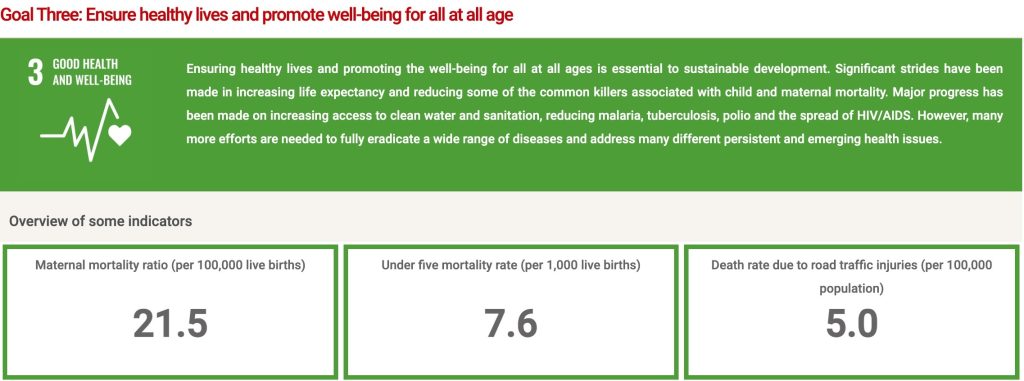SDG 3 - Good Health and Well-Being
The SDG 3 aims to ensure healthy lives and promote well-being for all at all ages. The Gulf University has made significant efforts to achieve Sustainable Development Goal 3: Good Health and Well-being. By organizing various events such as the Breast Cancer awareness, Diabetes awareness, Sports Day etc. contribute significantly to SDG 3. These events align with the broader goal of ensuring healthy lives and promoting well-being for all at all ages. Thus, Gulf University works closely with the government and private sector to develop and implement innovative solutions to promote Good Health and Well-being, thru various community-based initiatives as mentioned above. By focusing on Good Health and Well-being and specific health issues like breast cancer, diabetes, stress, nutrition, hygiene GU is working to:
- Raise awareness: These events bring attention to critical health issues, promoting early detection, prevention, and treatment.
- Provide support: They offer support services, counseling, and resources to individuals and families affected by any health conditions.
- Advocate for inclusivity: These organizations advocate for the rights and inclusion of people with disabilities, promoting their well-being and empowerment.
- Promote healthy lifestyles: By encouraging regular check-ups, healthy eating, and physical activity, these events contribute to overall health and well-being.
Through these efforts, GU is making a tangible impact on the health and well-being of individuals and communities, ultimately contributing to the achievement of SDG 3. Besides, GU has collaborated with various health institutions to improve health outcomes and promote well-being.
Bahrain as a country has made significant efforts to achieve Sustainable Development Goal 3: Good Health and Well-being. The country has implemented various health policies and programs to improve health outcomes and promote well-being. On a national level, some of Bahrain achievements are mentioned on MoH Initiatives related to 2030 vision webpage, which are summarized as:
Aligned with Economic Vision 2030 of his Majesty the King, the Ministry of Health is committed to work as unified governmental system to ensure Sustainability, Competitiveness and justice in providing health care services. Ministry of Health adopted the Fourth Industrial Revolutions technologies that are based on diversity of income sources and non-reliance on Fuel as a sole source in addition to expanding digital industries and open the way for investments in the health sector.
MOH managed through these factors to set new health strategies and policies to keep up with latest global technologies, which helped in the development of health and therapeutic services by the serious follow-up of latest technologies in medical device industry. As it worked through 2030 Economic Vision to adopt developed E-Systems to enhance the performance of medical and nursing professionals and raise the quality of health services provided to patients.
MOH also put all modern systems into use to make the patients treatment journey much easier and comforting as it launched high-tech health projects that can detect many types of diseases individuals might have at an early stage of their lives and incorporated latest interactive applications to involve the public in the development of health care services through their suggestions and comments.
The commitment to 2030 economic vision is evident also in the private sector and experienced medical corporations inside and outside the kingdom, as MOH is keen on the involvement of private sector in health field through its donations and provision of high-tech medical devices in addition to the establishment of major health projects to strengthen the community partnership between the two sectors.
National Health Information System (I-Seha)
The National Health Information System (I-Seha) is one of the major developments in the health sector in the kingdom. I-SEHA system aims to implement a National Health Information Systems that applies the latest techniques on health services of the Ministry of health to improve services for patients and increase the efficiency of the quality and speed of delivery best available globally in pursuit of the paperless health services for citizens and residents of the Kingdom in relation to the provision of health systems (clinical).
The main purpose of this project is elevating the level of health services provided to citizens and residents likewise, by adopting the latest health technologies that ensure fast and easy access to health services. The project aims to implements a Unified National Electronic Health Record, which will facilitate work and ensure easy diagnosis and treatment of disease, as this system will encompass the medical history of all family members, moreover that it will contribute to prevention from diseases.
Bahrain Genome Project
The Ministry of Health’s initiative in establishing a specialized center for genetic analysis came as a result of the government’s overall efforts in improving the quality of health services in Bahrain and preventing diseases- particularly genetic, intractable and deadly diseases- by using the latest scientific innovations. The ultimate purpose of the center is to protect the Kingdom of Bahrain from illness and prevent diseases in current and future generations. The center will have a database of the Bahraini population’s DNA that will be analyzed and studied to identify opportunities that contribute to improvements in disease diagnosis, early detection, as well as lowering the population’s risk of contracting diseases. This will also contribute to the prevention of genetic diseases and to the development of effective medicines to treat them.
BI Dashboards
The Ministry of Health has adopted the BI Statistics dashboards, which is an interactive, statistical and informational dashboard hosted in MoH website www.moh.gov.bh. It provides real time statistics and indicators for the eservices and website’s activities interactions and transactions; such as: News, blogs, statistics, forms,..etc. As well as an interactive charts of the Open Health data. MOH performs ongoing cycle of self-evaluating for the Portal features like Admin Dashboard, Commenting, Rating, E-Services Statistics is used for analyzing the usage of the website. The results found from these tools are then going under data analysis process and according to specific KPIs on Visitors Satisfaction Index, Visitors Engagement, Visitors Complaints, Page Views and Bounce Rate.
Environmental Protection – Go Green Initiative
Go Green project is responsible for adopting Environment friendly practices and it reflects the ministry’s commitment to the implementation of Green Information Technology. The increasing interest in Green Information Technology was due to many factors most important of which are; high cost of Energy and Electricity, increase of Global Warming and increase of rules and legislations. That sums up the initiatives of Go green technique and how it should be implemented by organizations and Information technology directorates to fit environment.
Universal Healthcare
The Supreme Council of Health’s National Health Plan (2016-2025) is a 10-year vision for a healthy and safe society, ensuring health services are delivered with fairness, efficiency, and high quality. As part of the plan, in 2024, the National Health Insurance program (SEHATI) is due to be rolled out, which will be designed to maximize the use of technology, through the issuance of a chip enabled card containing medical data for all citizens and residents, and designed to enhance competitive, as citizens will be able to choose from different packages, alongside expatriate healthcare that will be funded by employers and made available in government and private facilities. Furthermore, visitors will receive a mandatory package, available in all government facilities.
Preventative Measures
The Kingdom of Bahrain offers immunizations free of charge for citizens as per a set schedule. Immunizations are a pre-requisite for school entry since 2012, with some vaccines, including booster doses, given to students at their schools to ensure full accessibility.
National Genome Program
The National Genome Program contributes to efforts towards improving the quality of health services and preventing diseases. Going forward, Bahrain plans to establish a specialized genetic analysis center using the latest scientific innovations, in partnership with Harvard Medical School.
Bahrain efforts for SDG 3:

Last Updated on November 27, 2024 @ 02:37:11 pm
